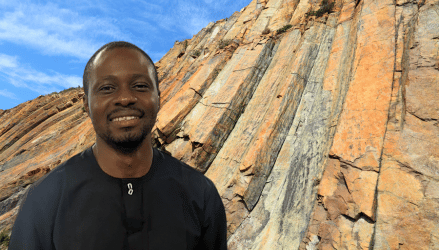Featured scientist: Dr Blessing Afolayan
The idea of studying an interdisciplinary subject that draws from mathematics and other sciences has always appealed, says Blessing Afolayan.

‘The idea of studying an interdisciplinary subject that draws from mathematics and other areas of science has always appealed to me. The questions I find most interesting are those that consider our own planet within the solar system, and am fascinated by the powerful tectonic and geomorphological processes that move continents and shape landscapes. This motivated me to beam my searchlight into the geosciences space.’ Dr Blessing Afolayan, who recently became a postdoctoral fellow with NITheCS at Stellenbosch University, adds that his philosophy of research stems from his conviction that the growth and development of a nation or any group of people depends on the extent to which they can ask pertinent questions about their livelihood and sustainability, and supply relevant answers to those questions.
‘I strongly believe in asking questions for the good of the people… I believe a single tree cannot make a forest and am fully committed to forging research collaborations to enhance my self-development and the development of others. I also intend to share my research findings with the larger scientific community, especially in understanding flow in porous media.’ He elaborates: ‘Interdisciplinary collaboration must continuously be at the heart of every enterprise. This ensures a particular question is being viewed with different lenses at the same time, and potential project mishaps can be spotted early. It is often said that if you want to go fast, walk alone, but if you want to go far, walk with other people. Research across disciplines brings broader perspectives, integrate methods and knowledge from various disciplines to address complex problems, foster collaboration and draw robust inferences for innovative solutions.’
Blessing notes that, while his doctoral research was focused on the assessment of hydrocarbon reservoirs and saline aquifers for carbon dioxide (CO2) storage through static and numerical modelling, he is ‘particularly excited at the prospect of broadening my focus to answer questions around machine learning in subsurface reservoir simulation.’ He points out that leakage of the injected CO2 is a major environmental concern and poses a critical risk in geological CO2 storage. ‘Machine learning techniques can be used to predict the probability of long-term leaks of wells in CO2 storage operations. Machine learning has become a vital tool in the geoscience and earth modelling space due to the advancement of computing power. Over the years, predictive analysis, machine learning and other artificial intelligence-based systems have all developed immensely in the oil and gas/energy industry. The oil giants have incorporated artificial intelligence and machine learning to hydrocarbon prospecting, well completions, optimisation of well performance and the whole hydrocarbon value chain. Predicting the effectiveness and evaluating the field application of successful geological CO2 storage requires the incorporation of geologic, petrophysical and reservoir characteristics, which can be achieved with machine learning, especially where conventional simulations may not provide successful solutions.’
Blessed with strong support ‘I have enjoyed the support and encouragement of both my nuclear and extended family. Academically, my dad, who holds two PhDs, has been a trailblazer. Through him I have learnt that learning never ends, and that the one who has stopped learning is truly a dead man.’ He comments that NITheCS is ‘playing a pivotal role in the development of the theoretical and computational sciences in South Africa. The transformation and socio-economic development that Africa needs desperately will be driven by organisations like NITheCS, because it is a melting point of diverse researchers, and it is a hub for interdisciplinary research. NITheCS and similar organisations are also enabling active knowledge and concept-sharing between researchers and academics across different disciplines.’
Finally, Blessings refers to the lyrics of the song used in an advertisement in Nigeria. ‘It says it’s up to us to make the world a better place… Europe and America are both experiencing a decline in students’ enrolment for geology and petroleum engineering courses, due to the global drive for cutting down on fossil fuel usage. I know the world will make a transition from fossil fuel dependence, but I believe in a transition that is just and reasonable. I will encourage young people to become fully involved in research within the science and engineering space, as these skills are required in creating a proper mix of the energy sources the world needs today.’
